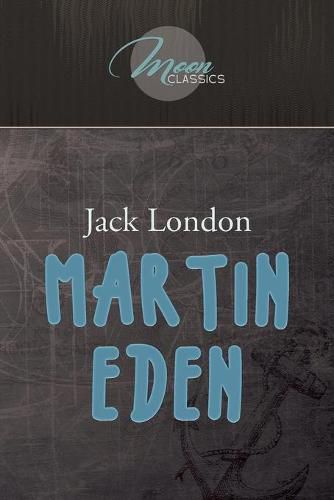Readings Newsletter
Become a Readings Member to make your shopping experience even easier.
Sign in or sign up for free!
You’re not far away from qualifying for FREE standard shipping within Australia
You’ve qualified for FREE standard shipping within Australia
The cart is loading…






This title is printed to order. This book may have been self-published. If so, we cannot guarantee the quality of the content. In the main most books will have gone through the editing process however some may not. We therefore suggest that you be aware of this before ordering this book. If in doubt check either the author or publisher’s details as we are unable to accept any returns unless they are faulty. Please contact us if you have any questions.
Martin Eden is a 1909 novel by American author Jack London about a young proletarian autodidact struggling to become a writer.
Living in Oakland at the beginning of the 20th century, Martin Eden struggles to rise above his destitute, proletarian circumstances through an intense and passionate pursuit of self-education, hoping to achieve a place among the literary elite. His principal motivation is his love for Ruth Morse. Because Eden is a rough, uneducated sailor from a working-class background and the Morses are a bourgeois family, a union between them would be impossible unless and until he reached their level of wealth and refinement.
Over a period of two years, Eden promises Ruth that success will come, but just before it does, Ruth loses her patience and rejects him in a letter, saying, "if only you had settled down ... and attempted to make something of yourself". By the time Eden attains the favour of the publishers and the bourgeoisie who had shunned him, he has already developed a grudge against them and become jaded by toil and unrequited love. Instead of enjoying his success, he retreats into a quiet indifference, interrupted only to rail mentally against the genteelness of bourgeois society or to donate his new wealth to working-class friends and family. He felt that people did not value him for himself or for his work but only for his fame.
The novel ends with Eden's committing suicide by drowning, which contributed to what researcher Clarice Stasz calls the "biographical myth" that Jack London's own death was a suicide.
London's oldest daughter Joan commented that in spite of its tragic ending, the book is often regarded as "a 'success' story ... which inspired not only a whole generation of young writers but other different fields who, without aid or encouragement, attained their objectives through great struggle".
$9.00 standard shipping within Australia
FREE standard shipping within Australia for orders over $100.00
Express & International shipping calculated at checkout
This title is printed to order. This book may have been self-published. If so, we cannot guarantee the quality of the content. In the main most books will have gone through the editing process however some may not. We therefore suggest that you be aware of this before ordering this book. If in doubt check either the author or publisher’s details as we are unable to accept any returns unless they are faulty. Please contact us if you have any questions.
Martin Eden is a 1909 novel by American author Jack London about a young proletarian autodidact struggling to become a writer.
Living in Oakland at the beginning of the 20th century, Martin Eden struggles to rise above his destitute, proletarian circumstances through an intense and passionate pursuit of self-education, hoping to achieve a place among the literary elite. His principal motivation is his love for Ruth Morse. Because Eden is a rough, uneducated sailor from a working-class background and the Morses are a bourgeois family, a union between them would be impossible unless and until he reached their level of wealth and refinement.
Over a period of two years, Eden promises Ruth that success will come, but just before it does, Ruth loses her patience and rejects him in a letter, saying, "if only you had settled down ... and attempted to make something of yourself". By the time Eden attains the favour of the publishers and the bourgeoisie who had shunned him, he has already developed a grudge against them and become jaded by toil and unrequited love. Instead of enjoying his success, he retreats into a quiet indifference, interrupted only to rail mentally against the genteelness of bourgeois society or to donate his new wealth to working-class friends and family. He felt that people did not value him for himself or for his work but only for his fame.
The novel ends with Eden's committing suicide by drowning, which contributed to what researcher Clarice Stasz calls the "biographical myth" that Jack London's own death was a suicide.
London's oldest daughter Joan commented that in spite of its tragic ending, the book is often regarded as "a 'success' story ... which inspired not only a whole generation of young writers but other different fields who, without aid or encouragement, attained their objectives through great struggle".